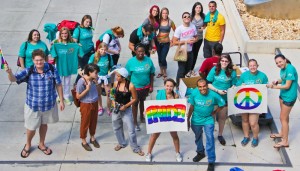All student activists have one goal in mind: change. Lambda United achieved results, but Occupy FAU only got more and more disorganized, leaving us scratching our heads.

Most confusing
Occupy FAU
Nobody ever knew what to expect from an Occupy FAU event, but that was OK because organizers didn’t either.
After trying long and hard to figure out what Occupy FAU is, we think we have an idea. See if you can follow along.
According to supporters, it is a movement in solidarity with the Occupy Colleges network. This means they do on-campus protests against higher tuition and faculty layoffs, based off of ideas they get from www.occupycolleges.org.
In 2011, Occupy FAU’s events consisted of protests, gatherings, strikes and one teach-in (which was a gathering of students and faculty members expressing their opinions). They always said they would be against tuition hikes, faculty layoffs and budget cuts, but no one ever said what exactly would happen at these events, or how their chanting and poster-holding would solve anything.
“We don’t have control over what happens,” said organizer, Gonzalo Vizcardo, about a “strike” they had in November. “It all depends on the students; there’s nothing planned,” was a frequent answer from him – and he wasn’t lying. The events were planned, to get everyone together, then go with the flow.
“It’s not like an organization. There’s no one in charge. So they’re not really creating an agenda, because that’s a more traditional way of organizing,” said FAU Faculty Union President and film professor Chris Robe. Or maybe that traditional agenda would make it easier to understand how they plan to achieve anything.
FAU College Republicans Vice President Jon Taylor was thinking something similar. “I find it very confusing that students utilize multi-billion dollar corporations to spread their anti-capitalist message,” said Taylor.
“Don’t they realize that they are contributing to the economy when they use their $800 smart phones to send tweets about their socialist agenda? What are they occupying, exactly? Classrooms? Aren’t we supposed to be on campus anyway?”
Our point exactly.
Maybe these student activists have the right ideas, but because of how much they made our heads spin last year, Occupy FAU is the most confusing student activist group.

Most active
Lambda United
Most activist groups rally and protest, but Lambda United (LU) raised awarness in a way that actually made a difference.
These student activists had quite a busy year putting on events like the first ever gay pride march, drag show and a lesbian, gay, bisexual, transgender and queer/questioning (LGBTQ) rally. It was all worth it when the university’s Board of Trustees decided to amend Regulation 5.010, which added sexual orientation to FAU’s anti-discrimination policy. This highly affected the LGBTQ community, because now people can’t be harassed at FAU for their gender preference.
LU held its first annual drag show in September, which was such an unexpected hit that the student union’s Majestic Palm Room wasn’t even big enough to hold the crowd of over 200 people.
Another first was their gay pride march in October and an LGBTQ rally in November, which drew over 50 supporters.
LU President Frank Gorritz said, “I see the pride in their faces. They feel like somebody special and not like a victim.” Gorritz describes his fellow members as “heroes” and admires them a lot.
Gorritz said he owes some of the group’s success to the LGBTQA Resource Center, which opened earlier last year. The center is a place where lesbian, gay, bisexual and transgender students can hang out and feel safe. The way Gorritz puts it, the resource center gives LU members support and helps it grow.
And they’re not planning on slowing down anytime soon. They have big plans for the new year, including finding ways to show their members more support and putting on more new events.
You could say LU just had a good year, but the fact is that they worked hard to make a name for themselves. Their growing support will only make them stronger – and if we were a student activist group, we’d be taking notes.



















